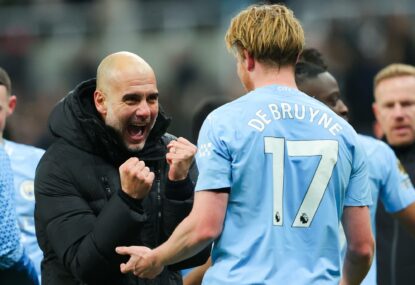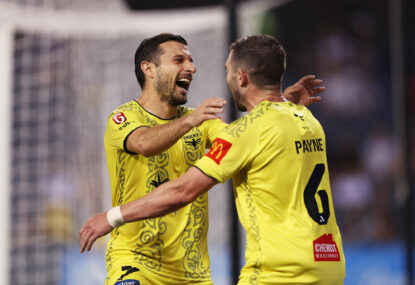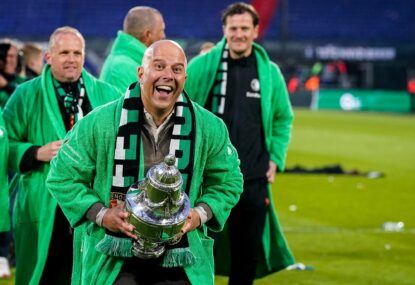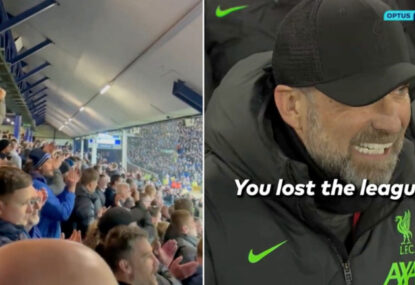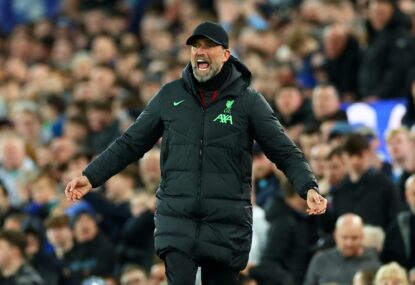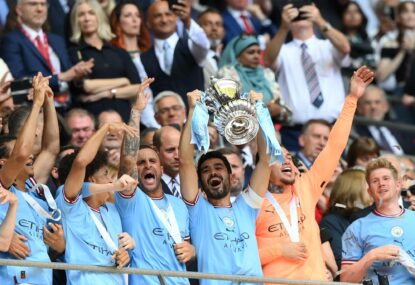Goalkeeper Chris Barty darts up the pitch and launches into a knee slide before climbing atop a huddle of green and gold. Coach Kai Lammert pumps a fist.
The bench is cleared.
The Pararoos have just beaten Portugal for the first time in twelve years to kick off their Cerebral Palsy Football World Championships campaign.
Jubilation abounds, the realisation that the Aussies mightn’t have even made it to St George’s Park – the home of English football – adding a coat to the sweetest of victories.
It was the Pararoos’ first competitive match in more than 18 months, a tumultuous period that threatened to change the face of Australia’s Paralympic football team.
After the Australian Sports Commission cut its $175,000 funding – citing the team’s slim chances of a Paralympic medal – the Pararoos program was thrown into disarray; a costly month-long trip to the UK looking an impossible task.
But the FFA and the Australian Sports Foundation partnered for a fundraising campaign that breathed life back into the squad.
A group of passionate footballers had their holy grail ripped away and one look at the commitment shown at the World Championships over the last week makes it clear why this team must be afforded a lengthy future in the game.
The Pararoos finished the group stage in third, missing out on qualification to the knockout stage, which would have guaranteed them a place at Rio 2016.
Following the victory against Portugal in their opener, the decisive match was against the Republic of Ireland on Thursday.
The Irish, ranked seventh in the world, ran out 4-1 winners despite another solid defensive display from the Pararoos, and breezed past Portugal on Saturday to take second spot.
Kai Lammert’s men rounded out the group stage with a 5-0 loss to world number one Russia – a respectable defeat when considering the gulf in resources between the two nations.
They’ll now enter a playoff for the minor placings, with a first round bye due to Iran forfeiting their place at the tournament over visa issues.
Regardless, they’re brimming with the belief that had been snatched away almost 12 months ago.
“There was no goal. If there is no goal in life, it can become pretty dull,” coach Lammert told The Roar.
“They suddenly got something back and now the players who are playing want to keep their shirt and the players on the fringe want to get into the team. The young kids look up to the players in there, so you have got this goal again, which is big.
“They put so much pride into this shirt and they work so hard. Not only for them, but for a lot of young CP footballers out there who aspire to be a Pararoo, aspire to represent the country. This is bigger than anything so it’s very important that the Pararoos stay alive for generations to come.”
Whether they qualify for Rio or not, the road ahead promises to be a challenging one. When they return to Australia, rigorous planning awaits to make the current program sustainable.
While the FFA copped significant criticism for not intervening before the funding cut, it was a decision ultimately out of their hands and they have since proven they’re in the Pararoos’ corner.
David Gallop’s backing of the fundraising model has been backed up by an appearance by High Performance Director Luke Casserley at the World Championships, strengthening the relationship between the governing body’s arms in a month where the Socceroos and Matildas have commanded attention.
While the Pararoos are focused on survival at present, the goal remains to challenge the world’s best sides in the near future.
Irregular training camps and the odd tournament appearance is only just feasible in the current setup, with most players cutting their teeth in the 11-a-side game.
The World Championships has provided an eye opener to the potential of Paralympic sport. World beaters Russia operate a professional league and an elite training system that puts them a class above.
The English FA has pumped millions into their team to improve development and recruiting, offering incredible training facilities at St George’s Park.
Most of the world’s top ten sides have players in elite squads training up to twice a day. The game is treated with great respect around the globe and the rewards justify such commitment.
Captain David Barber knows more than most the impact a full time program could have in Australia.
The 35-year-old was part of the inaugural Pararoos team formed ahead of the 2000 Sydney Games. He and Chris Pyne are the only two members of that side still standing.
Having overcome Portugal and tested Ireland, Barber was left to rue the gap that Australia can only bridge with a professional setup.
“It would make a huge difference, it’s incredibly frustrating,” he said. “I sat in the dressing room (following the Ireland defeat) and I just wondered what if? At 2-1 with ten minutes to go, looking back on tape there were half a dozen moments in the game where that little bit of sharpness, a little bit earlier identification of situations… there is a half dozen moments in any game that can turn it and if you’re the better prepared team, they’re usually the moments you win.
“Just a little bit of sharpness, a little more experience, a little more time, who knows what could have been?”
To understand where they’re going, we must acknowledge where they come from. Barber’s condition was only made apparent to his 11-a-side coach when he left a training session limping as the result of fatigue.
Fellow veteran Chris Pyne was left paralysed after falling from a cliff while bushwalking in NSW’s Blue Mountains. When he was able to talk again, he asked his parents when he would be able to play football again.
And perhaps the standout story of the Pararoos’ Championship campaign is Zac Jones. Four years ago, he couldn’t walk or talk following a skateboarding accident.
Until then, he played rugby league, but just a matter of months ago he stepped onto the football pitch. You’d never have thought his man of the match performance against Portugal – in which he nullified one of the oppositions’ greatest threats – was a his international debut.
The Pararoos program sets a platform of purpose for all Australians with cerebral palsy or an acquired brain injury. The damage of taking away that avenue is unthinkable.
Now with fundraising heating up and a four-year plan in place to not only resurrect the program but drive it forward, things are looking up.
This team is the product of circumstance, and although their future is mostly out of their control, they’ve played their part in England over the last week, with three performances that left no doubts about what it means to represent Australia.
If you would like to give the Pararoos a helping hand, donate here.





























































































